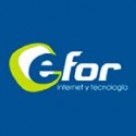IOT barometer (Part 1): Commitment and transformation
In order to be able to talk to you about this technology using real and concrete data, we have taken as our starting point the World IoT Barometer that Vodafone has been publishing for five years and where 1,096 representatives of companies from all over the world, from all sectors (including the public) and of all sizes, from multinationals with more than 10,000 employees to SMEs with 10 employees, have been consulted.
The 2016 barometer has synthesized all the surveys conducted into five conclusions. In this first article we will focus on the first two: "the commitment of the organization is key to obtaining better results" and "the adoption of the IoT fosters business transformation".
According to the results obtained in Vodafone's global study, the investment situation in IoT in 2016 can be summed up in two figures: companies allocate on average 24% of their IT budget to this area, and 4 out of 10 allocate more than 20%. In fact, in many cases, they already invest in the Internet of Things the same percentage as in other areas such as analytics, mobile solutions or the cloud.
Another significant fact is that there is a clear relationship between the part of the budget allocated to IoT and the results obtained. Thus, companies that invest more than 40% of their IT expenditure claim to have had a "significant" ROI of almost 80%.
In this sense, the barometer also points out that half of the companies have several Internet projects of Things underway. This is so because, according to Vodafone, when an organization commits to the IoT it quickly sees the opportunity and benefit of implementing them in other areas.
For example, a Spanish utility explains in this study: "We have several telematics projects such as smart metering; we are also testing smart security cameras that will replace agents; and a third pilot project on remote control of electric vehicles. IoT is no longer just another game of the IT department; it affects the entire organization and can be implemented in any area.
The study also highlights the importance of management commitment. Their support is an essential condition for an IoT project to progress and, in some cases, only the support of the Directorate can help overcome the transition successfully and ensure that IoT projects can be coordinated effectively with other technologies and in all departments.
IoT projects can be any shape and size, although projects are more likely to be large, 55% of companies with less than 100 connected devices claim to have a significant return on investment. In addition, this type of simpler implementations allow to justify the investment in a more immediate way and, in this way, to obtain the support of the company to tackle later more ambitious projects.
"Justifying a project on a regular basis is complicated, costs money and the company looks at it reluctantly, so we chose to implement it in several phases. This helps justify the expense because the return on investment starts to show soon and builds confidence in the project," says a UK-based transport company.
The Vodafone study groups the IoT projects initiated by the companies consulted into six main categories (see image 1).
The categories most used by companies are the first three, called "operational", almost half of the companies surveyed have at least one project underway in one of these three categories. These organizations will ensure that the main benefit obtained is the improvement of the customer experience, closely followed by the increase in employee productivity; that is, it is no longer just a question of saving costs.
"IoT is part of the customer strategy. Not only does it spark a technical debate, but we also address the possibilities it offers in terms of customer loyalty," explain a German-based automotive multinational.
Apart from categorising the business sectors where IoT projects are being implemented, Vodafone's study sets out five phases in their implementation ranging from "using this technology to activate a manual process" to "supporting the transformation of a large-scale enterprise" (see image 2).
This second conclusion of the barometer insists that the adoption of IoT not only implies a technological change but also brings a profound organizational change in the organization that involves, for example, going from selling products to providing services, with a rethinking of business processes in almost all functional areas.
These transformative programmes require greater coordination, support from the various business units and management commitment to drive them forward. The Internet of Things has ceased to be a cost-cutting mechanism and has become a competitive differentiating element of the 21st century.
You can access the complete study in this link: Barometer IoT 2016 Vodafone

